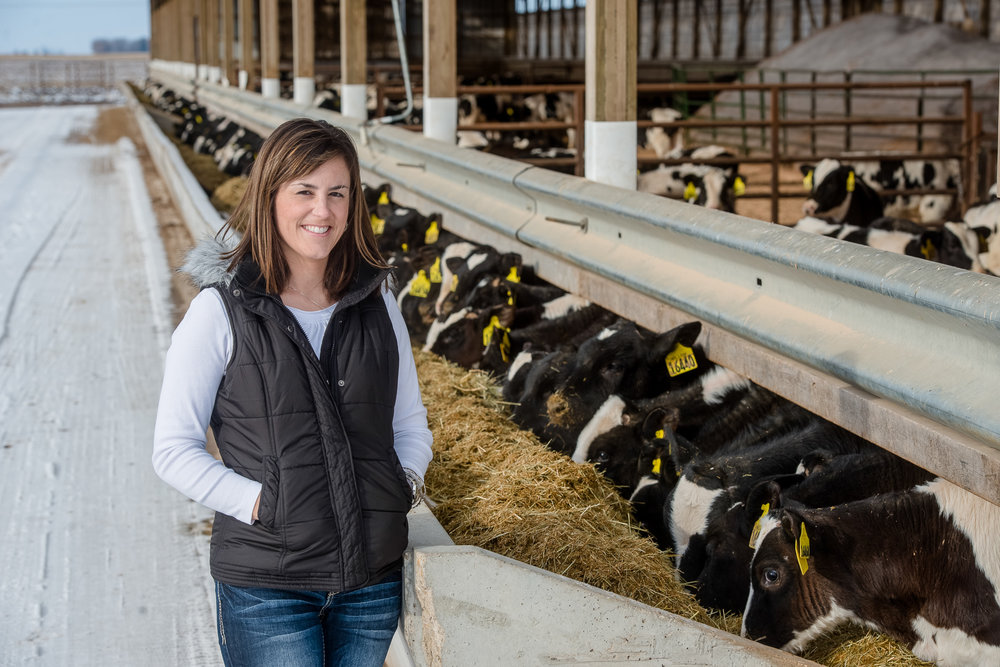Comfort For The Livestock Family
December 15, 2016
By Ann Thelen
Iowans are blessed with beautiful changing seasons. We've all heard the saying that if you don't like the weather, stick around – it will change soon enough! Sometimes the weather changes in a matter of days or even just hours. Weather extremes are part of our landscape, and we know the toll they can take on us. From blizzard conditions in the winter to heat indices that rise in excess of 100 degrees in the summer, those variances can be tough on livestock, too. That's why so many of Iowa's farmers go to great lengths to keep livestock comfortable and healthy. Caring for livestock takes an enormous amount of hard work, planning and hours of around-the-clock care.

One visit to Rod and Missy Bice's century-old Golden Circle Farm in Boone County, and it's easy to see that animal comfort rises to the top of their priority list.
The Bice family has a sizeable operation, with approximately 1,400 acres of row crops and hundreds of cattle and hogs. Controlling the animals' living environment is essential to livestock performance and can impact cattle and pigs at every stage of their growth cycle.
Buildings on the Bice farm have been fitted with extra insulation and insulated curtains on the north walls provide protection from weather’s elements. Zone heating also aligns with the needs of the pigs to provide more consistent temperatures.
With ideal conditions, the animals gain weight more effectively and absorb and retain vital nutrients. Well-cared-for animals lead to safe, nutritious and wholesome products that are high in protein, iron and vitamins.
Feeding a balanced diet to the animals, which includes avoiding overfeeding and underfeeding, helps to optimize feed and nutrient use. Feed is an essential – and costly – input for farmers. By controlling climate conditions, farmers can have a measurable impact on how much energy animals are expending and how nutrients are absorbed.
"In the summer, feed consumption will go down when our animals are comfortable," Rod Bice says. "In the winter, if the animals are too cold they will burn more energy – and eat more – just to keep warm."
Over in eastern Iowa in Washington County, Tim and Erin Brenneman are part of a family farm which includes a 29,000-sow farrow-to-finish operation. The Brenneman's actively participate in the We CareSM responsible pork initiative led by the National Pork Board and the National Pork Producers Council, which means they focus on raising quality pork in an efficient, humane and environmentally responsible manner.
"We have 700-900 piglets born every single day, so comfort is incredibly important to our livestock," Erin Brenneman says. "When a two-pound baby piglet is born to a 500-lb. mom, we need to accommodate both animals living together, especially when their temperature needs are different."
Pigs, like people, need to maintain a constant core body temperature. As soon as pigs are born at the Brenneman operation, every single one is dried with a towel and a talc-based drying powder. Pigs aren't born according to any particular schedule, so staff works 24 hours a day, seven days a week to keep the animal care processes running smoothly.
Maintaining temperature is critical. Even in the late fall or early winter months, it can be warm during the day but cold at night. Heat lamps on microzones adjust to the variances in temperature by automatically raising and lowering and auto-dimming as the sensors detect temperature.
"Our barns stay 72-73 degrees all year," Brenneman adds. "In the summer, we use evaporative cooling and fans are always running. Keeping our pigs cool through the hot, humid spells of summer and warm during the winter months improves growth, reproductive health and meat quality."
Kellie Blair and her husband AJ are fourth-generation corn, soybean, cattle and pig farmers who live near Dayton.
"There are so many ways we can help animals to keep them healthy and comfortable – it's central to what we do. Our main goals are to keep them fed, watered and healthy," Kellie Blair says.
Like people, stress can have a negative impact on an animal's health. For livestock, weather can be one of the biggest stressors. At the Blair farm, pigs are feed inside a confinement, and in the winter, the barns are warm.
Cattle can withstand extreme cold as long as they are dry. To help with this task, the Blairs have a monoslope cattle barn which provides shelter and allows southern sunlight to penetrate through to the north wall so cattle can soak up the warm rays and be protected from bone-chilling winds.
"The barn features a curtain on the north side, which is usually open for air flow; however, it can be closed in cold or stormy weather and provide shelter for our cattle," Blair adds.
Stewardship and sustainability are cornerstones to every action on these three Iowa farms. Whether it's in the way animals are cared for or the way the families care for the land they farm, these values are ingrained in everything they do.
"People put their trust in us to raise healthy animals and animal welfare is at the core of everything we do. We care deeply about the animals we raise and the land we farm," Brenneman says.
Follow along with Erin Brenneman or Kellie Blair on social media to see how they care for their livestock year-round.
Erin Brenneman
Facebook: Brenneman Pork, Inc.
Snapchat: @spookgal
Kellie Blair
Facebook: Home Again Finnegan
Snapchat: @Kellieblair